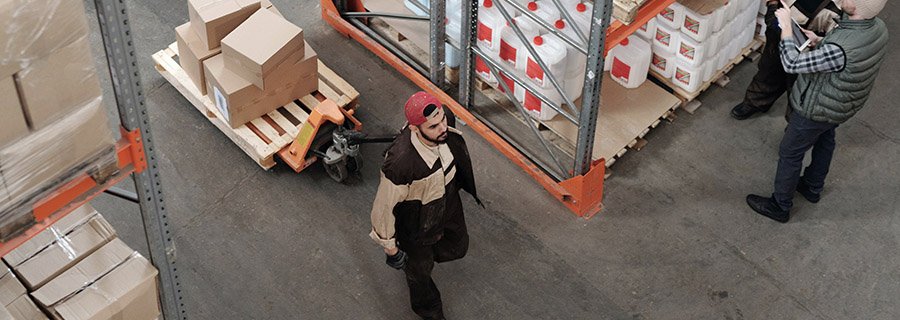Are you a budding entrepreneur looking to dip your toes into the world of e-commerce? Starting a dropshipping business can be an exciting and profitable venture, whether you're looking to kickstart your entrepreneurial journey or diversify your income streams.
This business model allows you to sell products to customers without the need to maintain inventory or invest in products upfront. Moreover, with commitment and the right approach, you can build a sustainable source of income.
In this comprehensive guide, we'll walk you through how to start a dropshipping business, focusing on UK laws and regulations.
What is dropshipping?
Before delving into the nitty-gritty of starting a dropshipping business, let's begin with the basics: What is dropshipping?
Dropshipping is a retail fulfilment method where a store doesn't keep the products it sells in stock. Instead, when a store sells a product, it purchases the item from a third party (usually a supplier or wholesaler), who then ships it directly to the customer. In essence, the store never sees or handles the product.

How does dropshipping work?
Now that you understand the concept of dropshipping, let's break down how it works:
1. Set up an ecommerce store
To start, you'll need to create an e-commerce website or, if you’re selling via social media, select an e-commerce plugin that can be integrated with your profile. There are various platforms available, with Shopify stores being a popular choice for their user-friendly interface.
2. Select your products
After setting up your online marketplace, you must decide what products you want to sell. Research and identify your target audience, which will help you source the right products.
3. Find reliable suppliers
The success of your dropshipping business hinges on finding trustworthy suppliers who offer competitive wholesale prices and efficient delivery times. Reliable supply chains are crucial for customer satisfaction.
4. List your products
Once you've sourced your products, it's time to list them on your e-commerce store. Ensure that your product listings are detailed, accurately describing the product quality and specifications.
5. Fulfil customer orders
When a customer places an order on your site, you, in turn, place an order with your third-party supplier. They’ll then ship the products directly to your customer's address. This means you don't have to worry about stocking inventory or handling the shipping process.
6. Offer customer support
Offering exceptional customer support is key to a successful dropshipping business. You're the face of the business, and customers will turn to you with any questions or concerns.
7. Pay taxes
It's important to understand your tax obligations. In the UK, you'll likely need to register your business and pay taxes on your earnings. We detail more on your tax obligations here.
Is dropshipping legal?
Dropshipping is legal in the UK, as it's a legitimate business model. However, as with any business, there are legal aspects you need to consider. Ensuring that you're operating within the law is essential for the long-term success of your venture.
Is dropshipping profitable?
The profitability of dropshipping stores depends on various factors. Your product selection, marketing strategies and customer service all play an important role. It's a model that can be profitable when done right, but it's not a guaranteed path to wealth. Success in dropshipping requires effort, dedication and a well-thought-out strategy.
How can a beginner start dropshipping?
As with any business, launching a dropshipping venture requires a significant commitment and a long-term perspective. If you're expecting a six-figure income from just a few weeks of part-time work, you might be setting yourself up for disappointment.
Realistic expectations regarding investing time, money, and potential profits will help you stay motivated and persistent. If you're new to the world of dropshipping, follow these six simple steps to kickstart your dropshipping venture:
1. Research your target market
Start by identifying your target audience and niche. Understand your potential customers' preferences and pain points. This information will guide your product selection.
To do this effectively, consider using online tools and surveys to gather insights into your target audience's needs. Analyse your competitors in the e-commerce space, particularly those in your chosen niche. This will help you identify gaps in the market that you can exploit to offer unique products or services.
To also help validate your dropshipping business ideas and assess their potential, use tools such as Google Trends and Semrush. These tools can help you determine product trends, search volume and competitiveness.
2. Register your business
Depending on the scale and structure of your business, you should register your dropshipping venture. In the UK, you can choose to operate as a sole trader, partnership, or limited company. Each has its own legal and tax implications, so you need to understand the differences and select the one that best suits your needs.
For many small businesses and solo entrepreneurs, starting as a sole trader is a common choice as it’s the easiest structure to manage. However, registering a limited company can provide liability protection but involves more administrative requirements.
3. Select the right suppliers
Finding the right suppliers is fundamental to the success of your dropshipping business. Your reputation will be closely tied to the quality of the products your suppliers provide and their reliability in timely shipping orders.
Look for suppliers that offer competitive wholesale prices, a wide range of products and efficient delivery times. You can find these suppliers through online marketplaces like Alibaba, AliExpress, and SaleHoo, as well as through industry-specific trade shows and networking events.
Building a strong relationship with your suppliers is crucial. Open communication, reliability, and the ability to negotiate terms will be key factors in your long-term success.
4. Select an e-commerce platform
Choose a suitable ecommerce platform for your online store. Shopify is a popular choice for its user-friendly interface and a wide range of features that cater to dropshipping businesses. Other platforms, such as WooCommerce and BigCommerce, also offer robust options.
Your choice of e-commerce platform should align with your business goals and the level of customisation you require. It's essential to consider factors like ease of use, scalability and integration with dropshipping tools (or social media platforms) and payment gateways.
5. Set up your ecommerce website or social media page
Once you've selected your e-commerce platform, it's time to create an attractive and user-friendly website or social media page. When building your store, keep your target audience in mind. Your design, product listings and overall user experience should cater to their preferences and needs.
Product listings are a critical component of your store. They should be detailed, featuring high-quality images and informative descriptions. Consider using professional product photography and creating compelling content highlighting each item's unique selling points.
6. Launch and market
With your store set up and your products listed, it's time to launch and start marketing your dropshipping business. Effective marketing is crucial to driving traffic to your store and generating sales.
Remember that marketing is an ongoing effort. Always analyse your results and adjust your strategies as needed to maximise your reach and conversions. Monitoring your store's performance through analytics tools can help you track your marketing efforts and make data-driven decisions.

How to find dropshipping suppliers
The success of your dropshipping business hinges on finding reliable suppliers. Here's how to source the best partners:
1. Attend trade shows
Trade shows are an excellent way to meet potential suppliers in person and assess their product quality.
2. Online marketplaces
Platforms are great places to find suppliers. Look for those with positive reviews and a good track record.
3. Directly contact manufacturers
Some suppliers may be listed outside of popular marketplaces. In such cases, you can reach out to manufacturers directly and inquire about dropshipping opportunities.
4. Networking
Join industry forums and networking events. Building connections can help you discover hidden gems in the world of dropshipping.
5. Evaluate their services
Assess the supplier's fulfilment process, shipping costs, and delivery times. Ensure they can meet the expectations of your customers.
How to register a dropshipping business in the UK
While registering a dropshipping business in the UK is relatively straightforward, it's important to understand the legal requirements.
1. Business structure
Determine your business structure and whether you want to operate as a sole trader, partnership or limited company. If you’re unsure about how to structure your dropshipping business, speak to one of our expert commercial lawyers.
2. Business name
Choose a unique name for your business. Ensure it's not already in use by another registered company by using the HMRC name availability checking tool.
Consider applying for a trademark for your company name, logo and other creative assets for extra protection. Our Intellectual Property (IP) lawyers can help you identify what IP you own, apply for the appropriate protection and ensure you’re not infringing on anyone else's intellectual property rights.
3. Register with HMRC
You must inform HMRC about your business. This is essential for tax purposes. You can do this online through the HMRC website.
4. VAT registration
If your annual taxable turnover exceeds the VAT threshold (which varies annually), you'll need to register for VAT. This might apply to your dropshipping business, so keep a close eye on your earnings.
Depending on the circumstances, even if you are trading below that threshold, you may consider voluntarily registering your business for VAT. You should speak to an accountant about your options to ensure you make the best decision for your business.
5. Business Insurance
Consider getting business insurance to protect yourself from potential liability. We’ve compiled some of the most common types of business insurance to consider when you set up your business.
Learn more about business insurance
6. Employment law
If you plan to hire employees, make sure you're familiar with UK employment laws and that you have a binding agreement in place with your employees. Our team of employment lawyers can provide you with sound employment law advice so that you can understand your rights and responsibilities.
You’ll also need to comply with other legal requirements, such as ensuring that your employees have the legal right to work in the UK and are correctly registered with HMRC for PAYE tax and national insurance contributions, etc.
Do you pay tax on dropshipping?
Yes, as mentioned above, you’ll be subject to tax obligations when running a dropshipping business in the UK. Here's a brief overview:
1. Income Tax
As a sole trader or partner, you'll pay Income Tax on your profits. You must report your earnings to HMRC annually on your self-assessment form.
2. Value Added Tax (VAT)
You'll need to register for VAT if your taxable turnover exceeds the VAT threshold, which varies from year to year. As of 2023, the threshold is £85,000, but it's important to check the most recent figures to ensure compliance. VAT will be charged on the goods you sell, and you'll need to report and pay it to HMRC.
3. Corporation Tax
If you operate your dropshipping business as a limited company, you'll be subject to corporation tax on your profits. You'll need to submit your accounts to HMRC on an annual basis in the format required.
4. National insurance
If you employ staff, you’ll also be liable to pay employer’s national insurance contributions on the salary payments.
You should always keep thorough financial records and seek professional advice to ensure you meet all your taxation obligations. Remember, accurate reporting and timely taxation payments are legal requirements.
Do I need a VAT number for dropshipping?
The need for a VAT number depends on your business's annual taxable turnover. If your turnover surpasses the VAT threshold, you must register for VAT and obtain a VAT number. This is crucial as you'll charge and collect VAT from your customers.
As a dropshipping business owner, you need to monitor your earnings closely to determine if and when you need to register for VAT. Compliance with VAT regulations is vital to avoid potential penalties and ensure the smooth operation of your business.
Get legal assistance from LawBite
Embarking on the journey of starting and running a dropshipping business is a promising endeavour, but it comes with challenges and complexities.
We understand that entrepreneurs just starting on their venture need more than just legal advice. They require a dedicated partner who can provide comprehensive support throughout their business lifecycle.
Our mission at LawBite is to do law differently, making legal services more accessible and approachable for businesses just like yours. We're not just here to solve problems; we're here to empower you with practical and tailored legal solutions that meet your specific needs. As you navigate the world of drop shipping, our team of legal experts can be your trusted partner every step of the way.
Here's how LawBite can add value to your dropshipping business:
Setting up your business
We offer expert guidance in setting up your business, ensuring you choose the right business structure that suits your goals. Whether it's as a sole trader, limited company, or another structure, we help you make informed decisions to protect your interests.
Supplier contract reviews
Dealing with suppliers is a critical aspect of dropshipping. Our expert contract lawyers can review and negotiate supplier contracts on your behalf, ensuring that your agreements are fair, compliant and protect your business from potential disputes.
Compliance with UK laws
Dropshipping businesses in the UK must adhere to various consumer protection and data privacy laws. We can provide guidance on the policies and procedures required to ensure full compliance, protecting you and your customers.
Business scaling
To scale your dropshipping business and attract potential investors, you need a robust legal framework. We can assist you in preparing for investment rounds, creating pitch-perfect documents and guiding you through the complexities of business growth.
Starting a dropshipping business in the UK is a significant endeavour, and we're here to ensure that you're protected, compliant and positioned for success. To speak to one of our expert lawyers about getting your dropshipping business off the ground, book a free 15 minute consultation or call us on 020 3808 8314. We're here to help you navigate the legal landscape and ensure your business is protected and positioned for success.



